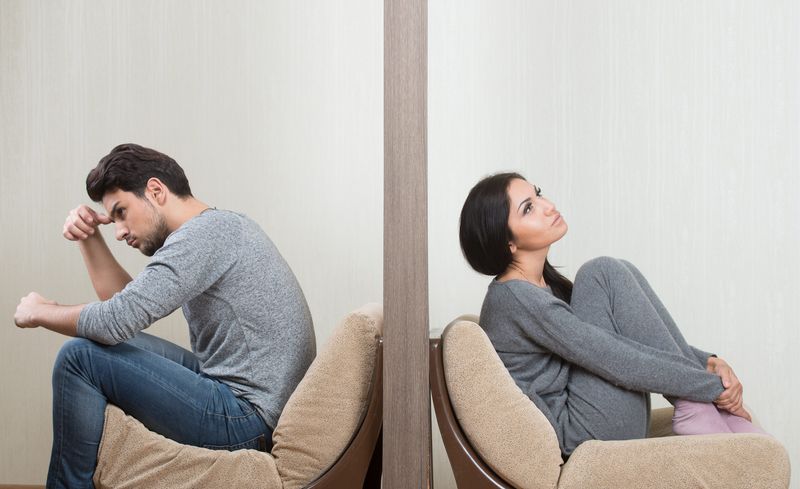13 Signs a Wife Is Choosing Comfort Over Genuine Love

Marriages sometimes reach a point where one partner stays not because of love, but because leaving feels too hard. When a wife chooses comfort over love, the relationship changes in noticeable ways. Understanding these signs can help couples recognize when they’re settling rather than thriving together.
1. She Stays Out of Habit, Not Desire

Morning routines, dinner conversations, and weekend plans follow the same predictable patterns week after week. Her actions are mechanical rather than motivated by genuine connection. The relationship has become as automatic as brushing teeth – necessary but not particularly meaningful.
Friends might notice she speaks about her marriage in terms of logistics rather than love. “We’ve been together 15 years” replaces “I’m so happy with him.” The comfort of familiarity has become a substitute for the discomfort of change.
Even when opportunities arise to deepen the relationship, she avoids them, preferring the safety of established patterns. The thought of disrupting this routine feels more threatening than the emptiness of continuing it.
2. Her Emotional Needs Are Unmet — And She’s Stopped Asking

Remember when she used to voice her feelings? Those conversations have disappeared. The silence isn’t because her needs are met – it’s because she’s given up hope they ever will be.
Watch for the subtle shift from “I wish we could talk more” to complete silence about emotional matters. This resignation didn’t happen overnight. It developed gradually as her requests for deeper connection were consistently ignored or dismissed.
Now she fills these emotional voids elsewhere – through friendships, children, work, or hobbies. The emotional withdrawal serves as self-protection. By expecting nothing, she can’t be disappointed, creating an illusion of stability that’s actually emotional abandonment in disguise.
3. There’s No Intimacy — But No Urge to Rekindle It

Physical affection has quietly vanished from the relationship. No goodbye kisses, no hand-holding during movies, no spontaneous hugs. What’s most telling isn’t the absence itself but her lack of concern about it.
Conversations about rekindling intimacy are met with indifference or deflection. “I’m just tired” becomes the permanent explanation rather than a temporary state. She doesn’t suggest date nights or romantic getaways anymore.
The physical distance reflects a deeper emotional disconnect. Unlike couples actively working through intimacy challenges, there’s no apparent desire to bridge this gap. The comfort of a sexless, touchless relationship has become preferable to the vulnerability required to rebuild physical connection.
4. She Fantasizes About a Different Life

Her browser history reveals vacation destinations for solo travelers. She follows social media accounts of people living radically different lives than her own. These aren’t casual interests – they’re escape hatches for her mind.
Conversations about hypothetical scenarios become increasingly specific. “If I could start over…” statements pop up more frequently, with detailed alternative life paths. Books and movies about people who dramatically changed their lives suddenly fascinate her.
Yet these fantasies remain safely in the realm of imagination. The gap between dreaming and doing remains wide because comfort trumps courage. Fantasy provides temporary relief while avoiding the upheaval of actually pursuing what might bring genuine fulfillment – a pattern that maintains the comfortable status quo while her authentic desires remain unfulfilled.
5. She Avoids Vulnerability

Conversations stay firmly in the safe zone – schedules, chores, and children. When deeper topics arise, she skillfully redirects with practiced ease. This emotional guardedness isn’t random – it’s strategic self-protection.
Watch how she responds to her husband’s occasional emotional disclosures. Rather than reciprocating with her own vulnerabilities, she offers practical solutions or changes the subject. Years of feeling emotionally unsafe have built these walls brick by brick.
Even during potential breakthrough moments – anniversaries, health scares, family milestones – she maintains emotional distance. The marriage functions like a well-oiled machine precisely because authentic feelings, which might disrupt the system, remain safely contained. Vulnerability requires trust that the relationship simply no longer supports.
6. She Prioritizes Practicality Over Passion

Financial security has become her primary measurement of marital success. Conversations about the relationship focus on mortgages, retirement accounts, and children’s college funds rather than emotional fulfillment or shared dreams.
Notice how she defends the relationship to others. “He’s a good provider” replaces “He’s my best friend” or “I love who we are together.” The marriage has transformed from a love story into a practical arrangement with clear benefits she’s unwilling to jeopardize.
When faced with relationship improvement suggestions, her resistance often centers on practical disruptions rather than emotional concerns. The stability of knowing exactly what tomorrow brings outweighs the uncertainty of pursuing deeper connection. This calculation isn’t cold – it’s a rational response to prioritizing security when love feels too risky.
7. Her Friends Notice She Seems “Checked Out”

Close friends exchange worried glances when she mentions her marriage. They’ve noticed the spark in her eyes dims when her husband calls. These outside perspectives often catch what those inside the relationship miss.
Old friends who knew her before the marriage might comment on personality changes – a once-passionate woman now speaking in measured, careful tones. Her responses to genuine concern typically involve quick dismissals: “Everything’s fine” or “That’s just marriage.”
The contrast between her energy levels alone versus with her spouse becomes increasingly obvious to others. While she maintains the external appearance of a functioning marriage, those who truly know her see the emotional vacancy. These observations from trusted friends often plant the first seeds of awareness that comfort has replaced genuine connection.
8. She’s Indifferent to Her Partner’s Attention or Absence

Whether he’s working late or sitting beside her, her emotional temperature remains unchanged. His compliments no longer bring a smile; his criticism no longer stings. This emotional flatline reveals a heart that’s neither invested nor engaged.
Watch how she responds when he cancels plans or makes special efforts. The lack of disappointment or appreciation speaks volumes about her emotional detachment. Weekend business trips or romantic gestures are met with the same shoulder shrug.
This indifference extends to conflicts too. Arguments that once would have triggered tears or anger now elicit only tired sighs or blank stares. The emotional neutrality isn’t peace – it’s disconnection. When neither presence nor absence affects her emotional state, the heart has effectively checked out while the body remains.
9. There’s No Shared Future Being Planned

Future conversations focus on separate paths rather than shared journeys. Her retirement dreams don’t include him. Vacation plans become increasingly independent. This parallel planning reveals she no longer envisions a truly connected future.
Listen for the pronouns she uses when discussing upcoming years. “I might” has replaced “We could” in her vocabulary. Major life decisions – career changes, relocations, large purchases – are contemplated without serious consideration of their impact on the relationship.
When he initiates conversations about shared goals, she participates halfheartedly or redirects to practical matters. The absence of mutual dreaming isn’t coincidental – it’s a subconscious acknowledgment that the relationship has no vibrant future. The comfortable present has become a substitute for a passionate shared tomorrow.
10. She Spends More Time Alone — And Prefers It

Her “me time” has expanded from occasional self-care to a dominant life pattern. Solo hobbies, separate friendships, and independent activities fill her calendar. The telling factor isn’t the separation itself but her visible relief when away from the relationship.
Pay attention to her energy levels before and after time apart. She comes alive during solo adventures but deflates upon returning home. This energy differential reveals where her authentic self feels most comfortable.
Friends might hear her say things like “I just need my space” with increasing frequency. While healthy relationships include independence, this pattern differs – it’s not balance but escape. The alone time isn’t recharging her for connection; it’s becoming her primary source of fulfillment while the marriage serves merely as a home base she’s increasingly reluctant to return to.
11. She Justifies the Relationship with “At Least” Statements

Listen carefully to how she describes her marriage. “At least he doesn’t drink” or “At least we have financial security” reveals a relationship evaluated by what it lacks rather than what it provides. These minimalist standards expose drastically lowered expectations.
Conversations with married friends turn revealing when they express relationship joy and she responds with these comparative defenses. The contrast between genuine enthusiasm and her qualified contentment becomes painfully obvious. Her benchmark has shifted from fulfillment to mere absence of disaster.
Family members might notice how she bristles at romantic movies or songs, dismissing them as “unrealistic.” This cynicism serves as armor against acknowledging what’s missing. By reframing mediocrity as success through “at least” statements, she protects herself from facing the gap between her comfortable reality and the connected relationship she once desired.
12. She’s Emotionally Closer to Someone Else

Her face lights up when texting a friend. The day’s small victories and disappointments go to her sister, not her spouse. This emotional rerouting isn’t just about having close relationships – it’s about systematically directing intimacy away from the marriage.
Pay attention to who hears her authentic thoughts first. Life updates, emotional struggles, and personal achievements reach others before her husband. When he does hear them, they’re already processed and presented as information rather than shared experiences.
The contrast between her guarded communication at home and her open conversations elsewhere grows increasingly stark. While external confidants are normal, they’ve become her primary emotional home rather than supplemental support. This outsourcing of emotional intimacy maintains the marriage’s comfortable structure while meeting her connection needs elsewhere, creating an illusion of balance that masks the relationship’s fundamental emptiness.
13. She’s Afraid of Being Alone — More Than She Desires Love

Fear reveals itself in how she responds to stories of divorce or widowhood. Her anxiety about these scenarios exceeds normal empathy, betraying her own underlying terror of independence. Financial worries often mask deeper fears about identity and capability.
Her self-perception has become entangled with her role as wife. Comments like “I wouldn’t know how to start over” or “Who would want me now?” slip into conversations. Years of comfort have atrophied her confidence in navigating life solo.
Notice her reaction to friends who’ve successfully rebuilt lives after relationships ended. Her discomfort with these stories exposes her own limiting beliefs. The marriage continues not because it fulfills her but because the alternative seems worse. This fear-based commitment creates the ultimate comfort trap – staying in emotional emptiness because the unknown represents an even greater threat than unlived potential.
15. She’s Lost Her Authentic Self in the Relationship

Old photographs tell the story – a vibrant woman whose personality has gradually dimmed. Interests she once pursued passionately have been abandoned. Opinions once expressed confidently are now muted or absent altogether.
Friends from her past might barely recognize the person she’s become. The adaptation wasn’t malicious or even conscious – it happened incrementally as she prioritized relationship comfort over authentic expression. Her vocabulary has shifted from “I want” to “whatever works for everyone.”
Watch for moments when her true self briefly surfaces – often when discussing past dreams or in the company of old friends. These glimpses reveal the gap between who she is and who she’s become. The comfortable marriage has become a container too small for her full self, yet the familiarity of this constraint feels safer than the vulnerability of authentic expression and the potential relationship disruption it might cause.

Comments
Loading…